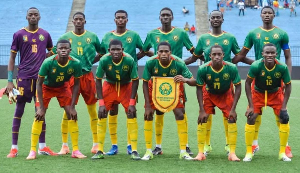Despite threats from the Confederation of African Football (Caf) to withdraw from the organization of the 2016 Africa Cup of women in Cameroon, construction of the Grand Biya Stadium is slumping.
This 60,000 seats arena located in the northern suburbs of Yaounde has not moved an inch since 2007. Local residents of the Olembe neighborhood are also having a problem with the government.
The French company, Razel, that initiated an extensive earthwork on the 288-hectare site, recently stopped by indigenous people who demanded compensation. What made the matter worse was that “the company responsible for the excavation stated work and destroyed crops, without warning the residents”, Francis Xavier Mbeng, the village chief of Olembé II told Cameroon Tribune.
These angry populations demanded the payment of compensation "promised in 2008" at the start of proceedings. A list of 52 families had been established and validated by the administrative authorities," reported the national daily.
This disrupts the conduct of business. The Cameroonian government also aims to build, with the help of its technical partner, the China National machinery and equipment import and export corporation, the National Institute of Youth and Sports (INJS) complex of 12,000 m2 with an Olympic swimming pool, a trainer, and multisport stadiums: basketball, volleyball, handball, and two tennis courts and a three star hotel with a capacity of 200 beds.
The total investment cost of this first phase was $ 94.6 billion equivalent to FCFA 170.8 billion for the second stage.
On the site of Douala, the capital of the Littoral region, the government was forced to go in search of a new non-swampy site, allowing a rapid progress of the work.
The new stadium at Bwang Bakoko will have a capacity of 50,000 seats. This site change has had terrible consequences on the programming of the matches of the AFCON 2016 Women championship. The economic capital will no longer host the meeting.
Beyond Yaoundé, the matches will be played at the Ngueme stadium located about eight kilometers from Limbe urban center in the Southwest. This is an arena of 20,000 seats with splendid views over the Atlantic Ocean.
The renovations of the main access roads have already been launched by the Minister of Housing and Urban Development, Jean Claude Mbwentchou, during a visit to the site early November. In addition to this is added the new Kouekong playground in Bafoussam (20,000 seats).
The new stadiums in Limbe, Bafoussam and Douala are part of the National Sports Infrastructure Development Program (Pndis) fruit of Sino-Cameroonian cooperation that runs until 2018. The project, which is spread over 10 years (2008-2018) has in principle two components.
The first, which costs more than FCFA 272 billion, the second component, involves the construction in all districts of the country, sports platforms. Meanwhile, phase-three aims to provide the main cities in Cameroon and particularly the regional capitals, modern and functional sports facilities.
The MINSEP also announced the rehabilitation of the Madagascar stadium in Yaoundé, resumption and completion of the Omnisports Stadium in Bafoussam which construction started in 1979 and was never completed. Not to mention the rehabilitation of stadiums announced like the Roumdé Adja in Garoua and most likely Ahmadou Ahidjo stadium in Yaounde and Douala Reunification Stadium constructed on the occasion of the eighth AFCON organized in 1972 and no longer meets international standards.
Sports Features of Thursday, 12 November 2015
Source: 237online.com















